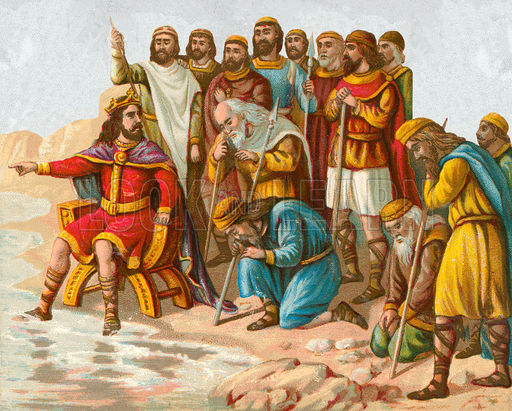
CANUTE,
KING OF ENGLAND.
As the result of a long-continued contest, the Danes settled in many parts of England. In the person of Canute they had conquered the Anglo-Saxon people, and for a time they extinguished the Anglo-Saxon sovereignty. He was king of Denmark and Norway as well as England, and all the historians call him a very wise and good king. William of Malmesbury says of him, "By his piety, justice, and moderation he gained the affection of his subjects, and a universal esteem among foreigners."
When Canute saw how cruelly the Danes treated the English, he made laws to prevent the Danes from doing any more mischief in England, and to help the English to make themselves comfortable again. He inquired of the judges and wise men concerning King Alfred's good laws, and having found them, he made the people use them. He restored many of the schools, which had been destroyed in the wars, and sent young men to the English college at Rome to study.
He acknowledged no difference between conqueror and conquered, between Dane and Englishman. Although he raised up four Earldoms, Mercia, Northumberland, Wessex, and East Anglia, and recognized their provincial independence, yet he drew close the ties that bound these rulers to his throne.
One great cause of animosity between the Danes and Anglo-Saxons had been their religion. Canute sought above all things to favor the Church and secure its friendship. His love for the monks of Ely is shown in the verses he wrote while hearing them sing, as he was being rowed over the fen-waters that surrounded their abbey.
“Merrily sung the monks of Ely when Canute
king rowed by,
low, boatman, near the land,
and hear we these monks sing."
His course of action, his ideas of right rule, and his grandeur of character are well expressed in a letter he wrote from Rome to his English subjects: "I have vowed to God to lead a right life in all things, to rule justly and piously my realm and subjects, and to administer just judgment to all. If heretofore I have done aught beyond what was just, through headiness or negligence of youth, I am ready, with God's help, to amend it utterly. . . . Never have I spared, nor will I spare, to spend myself and my toil in what is needful and good for my people."
Southampton was one of the places where Canute held court, at the old Roman Clausentum.* One day while holding his court here, he was walking with his lords by the side of the Southampton waters. Some of them, thinking to please him, began to praise him very much indeed. They called him Great, and wise, and good, and said they were sure he was so powerful he could do anything he chose, that even the waves would do as he bade them.
When they had talked this way for some time, he said, "I am tired, bring me a chair." When they had brought it, he had them place it close by the water's edge. As he sat in the chair, he said to the sea, "I command you not to let your waves wet my feet."
The flattering lords looked at one another in surprise.
Canute sat still until the waves came up so that the water wet him and all the lords who had flattered him so foolishly. Then he rose up and said, "Learn from what you see now, that there is no being really great and powerful but God!
He only who made the sea can tell it where and when to stop. "The flatterers saw with shame that the king was too wise to believe their false praise.
J. N. LOUGHBOROUGH.